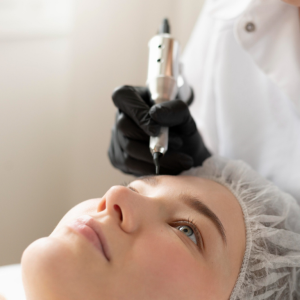For ages, women have been using eyebrow gels and pencils to give their brows a thicker and more beautiful look. But with the advancement in technology and cosmetic procedures, you can get natural-looking, fuller, and thicker eyebrows with the help of microblading treatment.
Even if you have lost your natural eyebrows because of some disease, accident, or surgery, you can get them back through this cosmetic technique.
Microblading, a semi-permanent cosmetic technique, helps create eyebrows that appear natural. The procedure is carried out by using a small device that has several microneedles. The device makes small punctures in the skin to deposit pigment under its outermost layer.
It produces hair strokes that look identical to natural hair strands, giving your eyebrows a bold, thicker, and busy look. Microbladed eyebrows enhance your overall facial impression and boost your confidence.
If you are also interested in booking an appointment for a permanent eyebrow makeup session, it is extremely important to discover whether you are a suitable candidate for this procedure.
Read on to know who is not a suitable candidate for Microblading Treatment.
 People with critical heart problems or who have implanted a pacemaker
People with critical heart problems or who have implanted a pacemaker
– During the cosmetic treatment, the device pricks the skin and inserts the pigment color into it.
– People with heart ailments can have excessive bleeding during the treatment, as they use medications that make their blood thin.
– In addition, the numbing cream that is applied to the skin can cause an increased heartbeat, which can give trouble to a heart patient.
Nursing or Pregnant Women
– The body of nursing or pregnant women undergoes a lot of hormonal changes, thus they may have risk of getting infections.
– Their skin may change after their delivery or weaning their child, so the eyebrow microblading results of such individuals can’t be predicted.
One with an Autoimmune Disorder
– An individual with an autoimmune disorder like frontal fibrosing alopecia or lupus is not the right candidate for the treatment.
– It is so because the compromised immune system puts you at a risk of getting skin infections.
Keloids
– Keloids are scars that grow abruptly above the skin.
– These scars can be red or pink, irregularly shaped, and might become large-sized over time.
– Microbladed eyebrows involve tiny punctures, so there are chances that people undergoing treatment for Keloids might develop keloid scarring.
Skin Conditions 
While microblading is a popular cosmetic procedure, it may not be suitable for everyone. People with certain skin conditions should avoid microblading, as it can worsen their condition or lead to complications.
Some of the skin conditions that make microblading unsafe include:
- Eczema: Eczema is a chronic skin condition that causes dry, itchy, and inflamed skin. Microblading can irritate the skin and make eczema flares worse.
- Dermatitis: Dermatitis is another term for inflammation of the skin. There are many different types of dermatitis, including allergic contact dermatitis, atopic dermatitis, and seborrheic dermatitis. All of these conditions can be exacerbated by microblading.
- Psoriasis: Psoriasis is a chronic autoimmune disease that causes the skin to grow rapidly. This can lead to thick, scaly patches on the skin. Microblading can trigger psoriasis flare-ups and make the condition more difficult to manage.
- Keratosis: Keratosis is a group of skin conditions that cause the skin to become thick and scaly. There are many different types of keratosis, including actinic keratosis, seborrheic keratosis, and psoriasis. All of these conditions can make microblading difficult to perform and can lead to poor results.
In addition to these skin conditions, microblading is also not recommended for people with:
- Active acne or other skin infections
- Sunburned skin
- Keloid scars
- Blood clotting disorders
- Allergies to tattoo ink
- Pregnancy or breastfeeding
If you are considering microblading, it is important to consult with a qualified microblading artist to discuss your skin health and whether or not microblading is right for you.
It is also important to note that there are other semi-permanent and permanent makeup options available for people with skin conditions. These options may be less irritating and less likely to cause complications. Talk to your Permanent Makeup Artist about the best options for you.
The results of a permanent eyebrow makeup procedure greatly depend on your skin’s quality and health. A professional cosmetic expert will evaluate your skin precisely to tell whether you are the right candidate for the procedure, and will guide you in achieving wonderful microblading results, which vary from person to person!







